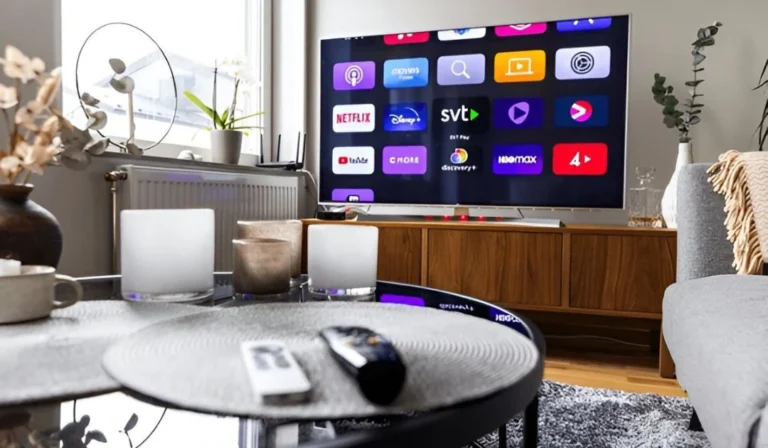Is IPTV Trends Legal?
You’ve probably heard about IPTV and its growing popularity. But you might wonder if it’s legal. The laws about IPTV are complex and change by country. It’s important to know the legal rules before you start.

Edit
Full screen
Delete
is iptv trends legal
When you explore IPTV, knowing the streaming laws in your area is key. Some IPTV services follow the law, but others might break copyright rules or other laws. Knowing this helps you choose the right IPTV services.
Key Takeaways
- IPTV legality varies by country and region.
- Understanding local streaming laws is crucial.
- Some IPTV services may infringe on copyright laws.
- Being informed helps you make the right choices.
- IPTV trends are constantly evolving.
What Is IPTV Trends?
IPTV Trends is changing how we watch TV. It uses internet protocol television technology. This platform streams TV channels and on-demand content over the internet. It gives users a flexible way to watch their favorite shows.
The Business Model of IPTV Trends
IPTV Trends works on a subscription model. Users pay a monthly fee to get access to its content. It’s like traditional TV but online, offering more flexibility and possibly lower costs.
The service collects content from different places. This includes live TV channels and on-demand movies or series.
Services and Content Offered
IPTV Trends offers a variety of services and content. This includes live TV channels, movies, and TV series. It’s available on many devices, making it easy to watch anywhere, anytime.
| Feature | Description | Benefit |
| Live TV Channels | Access to various live TV channels | Real-time viewing of favorite shows and news |
| On-Demand Content | Library of movies and TV series | Flexibility to watch content at any time |
| Multi-Device Support | Compatible with smartphones, tablets, smart TVs, and more | Convenience to watch on the go or at home |
Understanding IPTV Technology
IPTV is a way to watch TV over the internet. It’s different from old methods like satellite or cable TV.
How IPTV Works
IPTV sends TV shows to your device over the internet. It breaks the content into digital packets. Then, it sends these packets to your device, where they are played back.
Different Types of IPTV Services
IPTV services vary to meet different needs and preferences.
Subscription-Based Services
These services need a monthly fee for access to lots of content. They offer premium channels, on-demand shows, and high-definition streaming.
Free IPTV Options
Free IPTV services are available, but they might show ads. They have less content and stream quality can vary. It’s important to be careful with free IPTV, as it might not be legal or safe.
Is IPTV Trends Legal? The Direct Answer
To know if IPTV Trends is legal, we need to look at a few things. These include its content licensing and how it operates.
Content Licensing Status
The legality of IPTV Trends depends a lot on its content licensing. Legit IPTV services get licenses from content creators or owners. If IPTV Trends doesn’t have the right licenses, it might break iptv copyright laws.
Be careful with IPTV services that have lots of content but don’t say who they got it from.
Red Flags in IPTV Trends’ Operation
There are a few red flags that might mean IPTV Trends has legal problems. These include weird pricing and issues with content availability.
Pricing Inconsistencies
If IPTV Trends is way cheaper than other legal IPTV services, it might be illegal. Legal services spend a lot on licenses and setup.
Content Availability Issues
IPTV Trends might have content that’s not legal or say it has content it doesn’t really have. This could mean it’s breaking copyright laws.
| Indicator | Legitimate IPTV | IPTV Trends |
| Content Licensing | Clear licensing information | No clear licensing |
| Pricing | Competitive, reflects licensing costs | Suspiciously low prices |
| Content Availability | Content matches licensing agreements | Offers unauthorized content |
When checking out IPTV Trends, think about these points. They help figure out if it’s legal and if it’s safe to use.
Edit
Delete
Legal Framework for IPTV in the United States
IPTV services face a legal landscape shaped by copyright laws, the DMCA, and FCC rules. Knowing these areas is key to understanding IPTV’s legal status.
Copyright Laws Affecting IPTV
Copyright laws are vital in IPTV’s legality. They protect creators’ rights, ensuring their work is not used without permission.
IPTV services must get the right licenses for the content they stream. Not doing so can lead to legal trouble.
Digital Millennium Copyright Act (DMCA)
The DMCA is a key law for IPTV. It helps copyright holders protect their work online.
Under the DMCA, IPTV services can face legal action for copyright infringement. They must remove infringing content when notified. This is why many IPTV services have takedown procedures in place.
Federal Communications Commission Regulations
The FCC oversees many communication services, including IPTV. Even though IPTV is internet-based, it still follows FCC rules.
These rules cover things like accessibility, consumer protection, and content carriage. IPTV services must follow these to stay legal.
| Regulatory Aspect | Description | Impact on IPTV |
| Copyright Laws | Protect intellectual property rights | IPTV must obtain licenses for content |
| DMCA | Provides framework for copyright protection | IPTV must implement takedown procedures |
| FCC Regulations | Regulates communication services | IPTV must comply with accessibility and consumer protection rules |
The legal framework for IPTV in the United States is complex. It involves many laws and rules. Following these is crucial for IPTV services to operate legally and avoid penalties.
How IPTV Trends Compares to Licensed Services
When looking at IPTV options, it’s smart to compare IPTV Trends to licensed services. Licensed IPTV services follow the law, getting the right licenses for content. But, IPTV Trends might not be legal because it offers content without permission.
Content Acquisition Methods
Licensed IPTV services get content from official deals with providers. This means they have the right to share the content. It also helps creators get paid for their work. But, how IPTV Trends gets its content is a mystery, which could mean they’re breaking copyright laws.
Licensed services give you lots of content like live TV, sports, and movies. They do it all legally, protecting both the service and the viewer.
Pricing Structure Analysis
IPTV Trends costs less than licensed IPTV services. This might attract people who want to save money. But, remember, using IPTV Trends could be risky. Licensed services cost more but offer safety, quality, and legal protection.
Think about the money you save versus the risks when choosing between IPTV Trends and a licensed service.
Legal Consequences for IPTV Trends Users
Exploring IPTV Trends means knowing the legal risks. As a user, you could face serious legal issues. This is because of the potential for illegal streaming.

Edit
Full screen
Delete
iptv copyright laws
Potential Penalties for Streaming Illegal Content
Streaming illegal content through IPTV Trends can lead to big penalties. Copyright infringement is a big deal. You could get fined or even face criminal charges.
The fines can be very high. It’s important to understand the risks.
Recent Legal Actions Against IPTV Users
There have been recent legal actions against IPTV users. Law enforcement and copyright holders are cracking down. They’re going after people who use pirated content.
You should know you’re not hidden when using these services. It’s crucial to be aware of this.
ISP Monitoring and Copyright Notices
Your ISP might watch what you do online. They could send copyright notices if you access pirated content. These notices can cause warnings, fines, or even cut off your internet.
ISPs have to act against copyright infringement. It’s key to know this.
In summary, using IPTV Trends or similar services can lead to serious legal trouble. It’s important to be aware of the risks. Look for legal alternatives that follow streaming laws and iptv copyright laws.
How to Identify Illegal IPTV Services
IPTV has grown a lot, making it key to tell legal from illegal services. When looking at IPTV options, knowing the legal side is crucial to avoid trouble.
Common Characteristics of Unauthorized Services
Illegal IPTV services often show certain signs. These include:
- Prices that are way too low compared to other streaming services
- No clear contact info or a real address
- Poor or spotty streaming quality
- No clear info on who owns the content
Knowing these signs helps you avoid illegal IPTV and choose a legal provider.
Warning Signs in IPTV Trends’ Offering
When checking out an IPTV service, watch for warning signs. Look for too many channels without the right licenses, or promises of “free” premium channels. Services that use misleading marketing tactics or hide their operations are also red flags. Spotting these signs is vital for safe and legal IPTV use.
Legal Alternatives to IPTV Trends
You don’t have to use illegal IPTV services. There are many legal options. If you worry about IPTV Trends or similar services, you’ll find many legal streaming choices.
Licensed Streaming Platforms
Licensed streaming platforms have lots of content. You can find movies, TV shows, live sports, and news. They have the right licenses, so you know you’re watching legally.
Subscription-Based Services
Services like Netflix, Hulu, and Amazon Prime Video are great. They offer lots of content for a monthly fee. They always add new titles and exclusive content.
Free Legal Options
If you want free content, try Tubi, Pluto TV, and Yahoo View. They have TV shows and movies for free. They show ads, but it’s legal entertainment.
Legitimate IPTV Providers
For IPTV, look at legal providers. They offer lawful streaming. They get the right licenses for the content they provide.
| Service | Type | Cost |
| Netflix | Subscription-Based | $8.99-$17.99/month |
| Tubi | Free, Ad-Supported | Free |
| Sling TV | IPTV, Subscription-Based | $25-$45/month |
When picking a legal IPTV alternative, think about what you like to watch and how much you want to spend. You can choose a subscription service or a free, ad-supported platform. Either way, you can enjoy your favorite shows legally and with peace of mind.
The Gray Areas of IPTV Legality
IPTV legality is complex, with many gray areas. It’s important to understand the nuances of Internet Protocol Television. You’ll find issues with content redistribution and different laws around the world.
Content Redistribution Issues
Content redistribution is a big gray area in IPTV legality. IPTV services often share content they don’t own. This can lead to copyright infringement problems. This is illegal in many places.
For example, some IPTV services stream sports or TV shows without the right permissions. This hurts content creators and risks legal trouble for users.
“The unauthorized redistribution of copyrighted content is a significant concern in the IPTV industry, and it’s crucial for consumers to be aware of the risks involved.”
— IPTV Industry Expert
International Legal Variations
Legal frameworks differ across countries. IPTV services operate worldwide, but laws on copyright and broadcasting change a lot.
What’s legal in one country might be illegal in another. This makes it hard for IPTV services and users to know what’s legal and what’s not.
| Country | IPTV Legality Status | Key Regulations |
| United States | Generally Legal with Proper Licensing | DMCA, FCC Regulations |
| United Kingdom | Legal with Restrictions | Copyright Act 2011 |
| Australia | Legal with Specific Licensing | Copyright Act 1968 |
To understand IPTV legality, you need to look at content redistribution and international laws. Being informed helps you choose better IPTV services.

Edit
Full screen
Delete
iptv legality issues
Technical and Security Risks of Using IPTV Trends
Using IPTV Trends can put your personal data and money at risk. It might seem like a good TV alternative, but the dangers are real. Unverified IPTV services can be very risky.
Malware and Security Vulnerabilities
One big risk is malware. Unverified IPTV services can have harmful software. This can steal your data and let others access your device.
These services often use old software. This makes them easy targets for hackers.
Common malware risks include:
- Trojan horses
- Ransomware
- Spyware
Data Privacy Concerns
IPTV Trends can also harm your privacy. You might have to give out personal info. This info could be shared without your okay.
These services might watch what you watch. This could be a big privacy issue.
| Data Privacy Risks | Description |
| Personal Info Misuse | Unauthorized use or sale of your personal data |
| Activity Tracking | Monitoring of your viewing habits and online activities |
Financial Security Risks
Using IPTV Trends can also risk your money. You might give out payment info. If the service isn’t secure, your info could be stolen.
Some services might scam you. They could charge you without your permission.
To avoid these risks, choose licensed IPTV services. They focus on security and follow the law.
The Future of IPTV Regulation and Enforcement
The IPTV industry is on the verge of a big change. As TV moves to the internet, rules need to catch up. It’s not just about following laws, but making sure the market is fair and open.
Evolving Legal Landscape
The laws around IPTV are complex and always changing. Groups are tackling issues like copyright, licensing, and protecting viewers. For example, the Digital Millennium Copyright Act (DMCA) is key in the US. Keeping up with these changes is vital for both providers and viewers.
- New rules to fight piracy
- Tighter rules on content licensing
- Better protection for viewers
Industry Efforts to Combat Illegal Services
The IPTV world is fighting back against illegal services. Real providers are teaming up with authorities to find and stop fake ones. Expect more teamwork to create better ways to stop piracy. The question of is IPTV trends legal is getting more important as the field grows.
- Working together among industry players
- Creating new anti-piracy tools
- Spreading the word about IPTV rules
As IPTV becomes more popular, strong rules and strict enforcement are key. Knowing about iptv regulations is essential for navigating this complex world.
Conclusion
You now know a lot about IPTV Trends and its legal side. The legality of IPTV services like IPTV Trends depends on following copyright laws. Using unauthorized IPTV services can lead to legal trouble, including fines for streaming illegal content.
To understand the legal side of IPTV, knowing the risks of unauthorized services is key. Choosing licensed streaming platforms and legitimate IPTV providers is the best way to watch your favorite shows without legal problems.
As laws about IPTV change, it’s important to stay updated on the legal rules in the United States. This knowledge helps you make smart choices about what you watch and avoids legal issues related to IPTV.
FAQ
Is IPTV Trends legal to use?
IPTV Trends’ legality depends on its content licensing and copyright laws. If it streams copyrighted content without permission, it’s likely illegal.
What are the risks of using IPTV Trends?
Using IPTV Trends can expose you to risks. These include malware, data privacy issues, and financial security threats. This is especially true if it’s not licensed.
How can I identify if IPTV Trends is an illegal service?
Look for signs like low prices, content issues, and unclear licensing. Check user reviews and ratings too.
What are the legal consequences of using IPTV Trends if it’s illegal?
Using IPTV Trends illegally can lead to fines. Your ISP might also monitor your activity and send copyright notices.
Are there legal alternatives to IPTV Trends?
Yes, there are legal streaming platforms and IPTV providers. They offer content legally and follow copyright laws.
How does IPTV Trends compare to licensed IPTV services in terms of content acquisition?
Licensed IPTV services get content legally, through direct agreements. IPTV Trends might not have the right permissions or licenses.
What is the role of the DMCA in regulating IPTV services?
The DMCA helps copyright holders protect their content online, including IPTV. It requires providers to remove infringing content upon receiving a valid notice.
Can I get in trouble for using an IPTV service that streams copyrighted content without permission?
Yes, using such a service can lead to copyright infringement. You could face penalties or get copyright notices from your ISP.
How do international laws affect the legality of IPTV Trends?
IPTV Trends’ legality changes by country. Laws and enforcement vary, with some countries being stricter than others.
What is the future of IPTV regulation and enforcement?
The IPTV legal landscape is changing. There are efforts to fight illegal services and stricter rules to protect copyright holders and users.






